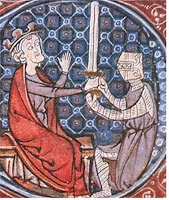The code of chivalry required that knights be honorable or conduct themselves in an honorable manner. The concept is vague and rooted in societal norms that change over time. What was honorable in the 12th century might not be considered so today and vice-versa. Essentially, it boils down to "doing the right thing" -- i.e. the morally correct behavior even if that is at odds with one's self-interest. At a minimum, however, honorable behavior entailed being honest and trustworthy.
The best evidence that Balian d’Ibelin was viewed by his contemporaries as a man of honor comes from no one less than Saladin.
Having fought his way out of the debacle on the Horns of Hattin, Balian found himself in the comparative safety of Tyre, but his wife and children were in Jerusalem. The Holy City was by this time denuded of defenders, but flooded by refugees. Furthermore, Salah ad-Din had vowed to retake Jerusalem for Islam, and a siege was immanent. In these circumstances, Balian requested a safe-conduct from Saladin to fetch his wife and children out of the endangered city and bring them to the comparative safety of Tyre. The Sultan granted the safe conduct on the condition that the Baron of Ibelin go unarmed and stay only one night; Ibelin took an oath to do exactly this.
On arrival in Jerusalem, however, the tens of thousands of Christians trapped in Jerusalem (reportedly between sixty and a hundred thousand) desperately pleaded with Ibelin to stay and take over command of the defense. The Patriarch explicitly told Balian that it would be more honorable to break his oath to Saladin than to keep it -- a clear indication that "honor" had more to do with doing what was "right" (by the standards of the day) than merely keeping one's word.
But what was the honorable thing for an Christian lord to do in such a situation? Keep his word and abandon tens of thousands of Christians to a hopeless siege that could only end in the slaughter or enslavement of them all? Or break his oath (his word of honor) and try to provide the disorganized refugees with military organization, leadership and expertise?
Ibelin saw his duty in defending the helpless -- despite the fact that this entailed condemning his own wife and family to remaining in the threatened city rather than taking them to safety. Unlike contemporaries like Guy de Lusignan and Reynald de Chatillon, however, Ibelin did not considers oaths to the Saracens meaningless. Instead, he wrote to Saladin, explained the situation, and effectively requested that Saladin absolve him of his oath.
The fact that Saladin not only did so, but also sent some of his own body-guard to escort Balian’s wife and children out of Jerusalem suggests that Saladin did not view Balian d’Ibelin’s action as dishonorable or as a betrayal. Furthermore, Saladin latter negotiated with Richard of England through Ibelin, again suggesting faith in his trustworthiness. Indeed, the tone of contemporary Arab chronicles in referring to Balian d'Ibelin (Ibn Barzan) testify to the degree to which Ibelin was held in high regard even by his enemies -- not because he was sympathetic to them but simply because he was "a man of honor."









